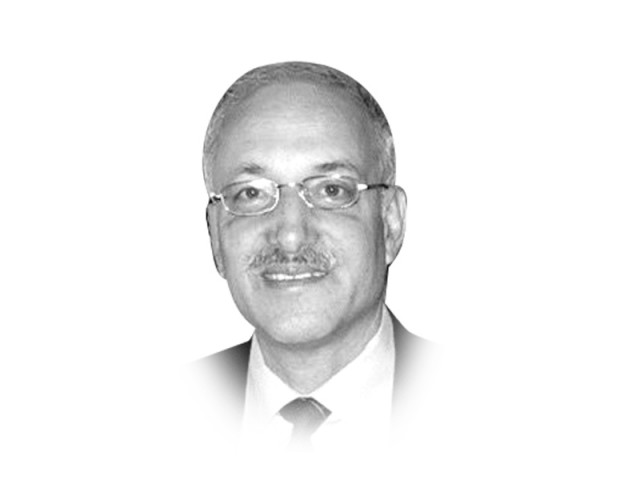What are the sarkars doing?
Let us give democracy a chance but this can only happen if we point out the faults of the sarkars.

tariq.rahman@tribune.com.pk
The Muslim League government has also made some advances in overcoming the power crisis but this is no easy matter. It will take a long time and even then, success will probably be only partial. However, free electricity to privileged people, institutions and Fata, etc. can be done away now and these measures will have tremendous symbolic value and bring in a rich harvest of goodwill in the cities of the country. However, there are problems. The most intractable one is that of terrorism. The PML-N government says it will talk to the Taliban. The Taliban have around 32 or more groups of whom only the Punjabi Taliban might talk to the government but even they will not hear about laying down their arms. So, if the PML-N wants to appease the public, which has been brainwashed, thanks not only to Imran Khan but the Sharifs themselves, that negotiations are the best strategy under the circumstances, then it is understandable. That way, the government can claim that we did nothing in a hurry but first exhausted all other options. But the strategy does mean more delay and maybe more deaths by the scores if not the hundreds. It also means more mayhem in Khyber-Pakhtunkhwa (K-P) and bad name to the PTI leadership in that province although it is the centre not the PTI, which is powerful enough to tackle the issue of the insurgency, no matter which province it is based in for the most part.
Let us now come to Punjab, which also has a PML-N government. Here, too, advances have already begun to be made towards the production of more power and even using alternative energy resources. Also, CM Shahbaz Sharif promises to improve education, transport and other services. However, the Young Doctors are still not satisfied and let us hope they let the medical sector function. There is, however, one grave failing of the Shahbaz government, which needs to be mentioned in this context. It overreacted to the PTI’s protest and the behaviour of the police was no better than it used to be in the days of Musharraf, Ziaul Haq, Bhutto and Ayub Khan’s governments. One has only to contrast this with the PPP rule under Asif Zardari, when the police could not be so abusive to political protesters. If Nawaz Sharif is to rule and be popular, this will have to change for the better, even if his younger brother does not like this kind of advice.
As for the K-P government, it appears to have failed to control terrorism but, as I said above, this is more a failing of the central government than the provincial one. The breaking of the Bannu jail might be a provincial failure but the power gained by the terrorists is a result of past policies and for that, the army, previous governments and also the present central government are responsible. However, one hears that the K-P police are confused or demoralised by Imran Khan’s stance that terrorism is a reaction to drone strikes and the fact that the PTI still does not clearly condemn the Taliban. This might be true but the overall responsibility to eliminate terror from K-P lies at the doorstep of the army and the centre, not K-P. It is also not true that the K-P government has not delivered what it had promised. After all, this is the first government to have initiated mobile courts. And if there is one service which the people will benefit from, it is the provision of good and quick justice. Other provinces should learn from this instead of simply criticising or ignoring this excellent initiative. Indeed, the next step should be to provide mobile teams of doctors in the whole country. Let us see who does that.
Balochistan can hardly be accused of having a government in the normal sense of the term. Yes, there is a decent chief minister but his job seems to be to offer apologies after busybodies in his set-up lodge formal FIRs against media houses and journalists for showing terrorist activities in Ziarat. But one hears that the FC calls the shots (pun intended) and the militant Baloch activists make the province ungovernable. Then there are rivalries and bids for power, which leave the well-meaning Dr Malik marooned. Balochistan needs a lifeline and for that, the centre must cooperate and not listen to anyone who advises dispensing with the government such as it is.
But it is Sindh we must worry about. Karachi is a battlefield with various groups, political and otherwise, and the armed Taliban fighting for booty, power and parts of the city to control. The MQM is calling for army intervention but the PPP is resisting this. But the sad truth is that a strict, no-nonsense, completely fair and unbiased military action is required in Karachi. This is not undemocratic; it will restore democracy and the writ of the state. Let us give democracy a chance but this can only happen if we point out the faults of the sarkars.
Published in The Express Tribune, September 2nd, 2013.
Like Opinion & Editorial on Facebook, follow @ETOpEd on Twitter to receive all updates on all our daily pieces.













COMMENTS
Comments are moderated and generally will be posted if they are on-topic and not abusive.
For more information, please see our Comments FAQ